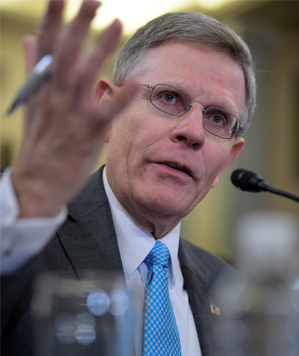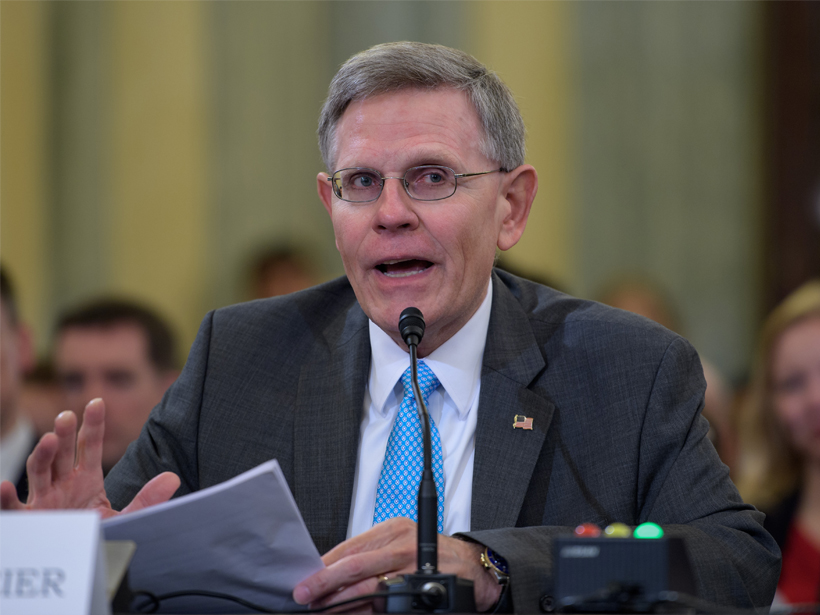The Trump administration’s nominee to be the next director of the White House Office of Science and Technology Policy (OSTP) pledged his support for scientific integrity and for maintaining the strength of the nation’s scientific enterprise during a friendly Senate confirmation hearing on Thursday.

“To me, integrity in science is everything. We owe that to the American taxpayer, we owe it to science, and we owe it to the future of our country to be honest and conduct science in the absolute most honest way, full of integrity and without being encumbered by political influence,” atmospheric scientist Kelvin Droegemeier, an expert on extreme weather, testified at the hearing held by the Senate Committee on Commerce, Science, and Transportation.
Droegemeier, who has received praise from many leading voices in the scientific community, recently stepped down from his position as vice president of research at the University of Oklahoma in Norman. He will take a leave of absence from the university if the Senate confirms him as head of OSTP.
Droegemeier served for 12 years as a member of the National Science Board (NSB), for which he was vice chairman from 2012 to 2016. He has also been the Oklahoma governor’s cabinet secretary of science and technology. Droegemeier holds a doctorate in atmospheric science from the University of Illinois at Urbana-Champaign.
Long Wait to Fill the Position
The hearing took place more than 19 months after the start of Trump’s presidency, despite repeated calls by members of Congress and the scientific community for Trump to quickly fill the post. If confirmed, Droegemeier will join an administration that has been criticized for a poor record on science policy, including censoring scientists, announcing its withdrawal from the Paris climate accord, and last week recommending a replacement for the Obama administration’s Clean Power Plan.
“His biggest challenge is the anti-science attitude of the administration.”
“Certainly, my role if I’m confirmed as director of OSTP, is to bring unbiased science, the best science available, to the executive branch, to all the parties, and make sure that that information is at the table and available for policy making,” he said at the hearing.
Sen. Richard Blumenthal (D-Conn.), a member of the Senate committee, expressed some doubt about how effective Droegemeier might be in the Trump administration. “His biggest challenge is the anti-science attitude of the administration,” Blumenthal told Eos. “I’m going to have additional questions for him because certainly the depth of anti-science bias in this administration has to be answered more forcefully than he did.”
Policy Experts Call Droegemeier a Good Choice
Several policy experts told Eos that Droegemeier may be just what’s needed in the Trump administration. NSB chair Diane Souvaine called Droegemeier “an exceptional choice.”
“The fact that this administration has selected him for this position means that he’s coming to an administration that wants to listen to him. I think that’s a wonderful turn of events and that he will do a good job,” she said.
William Hooke, senior policy fellow at the American Meteorological Society, said that Droegemeier “has got that combination of the science chops and the interpersonal qualities that will make him successful in this job.”
“You couldn’t have a stronger advocate for trying to protect the integrity of science.”
“Thank goodness we got a really high-quality person here at OSTP,” said Joel Widder, cofounder and partner at Federal Science Partners, a government relations firm focusing on science and technology based in Washington, D. C.
“You couldn’t have a stronger advocate for trying to protect the integrity of science,” Widder said. “He’s passionate, he’s protective of science, and yeah, he’s working in an administration that at least at some levels looks like it has been not quite on that page. But then, great for the science community to have somebody like Kelvin, because he certainly is outgoing and enthusiastic, and he’ll get the points across.”
Chris McEntee, CEO and executive director of AGU, which publishes Eos, said in a statement that Droegemeier “not only has the scientific expertise necessary for this position but also experience advising policymakers and communicating science to a broad audience, skills that are crucial for the task at hand.”
Getting Everybody at the Table About Climate Science
In response to questioning from Sen. Ed Markey (D-Mass.), Droegemeier also committed to the need to protect from political punishment federal government scientists who agree with the scientific consensus that human activity is the dominant cause of global warming.
“We have to…let the science take us where it takes us.”
On topics related to climate change, Droegemeier spoke in measured words. He said that there are multiple views and that “science rarely provides immutable answers about anything.”
“We have to, I think, be open and inclusive to all points of view,” he said. “I think science is the loser when we tend to vilify and marginalize other voices. I think we have to have everyone at the table talking about these things and let the science take us where it takes us.”
Droegemeier also noted the need for reducing uncertainties in climate models, the value in the weather and climate communities working with and learning from each other, and his hope to work on risk and resilience along with other issues.
Challenge to U.S. Science and Technology
During the hearing, Droegemeier stressed the importance of retaining the strength of the American science enterprise, particularly in light of increased competition from China and other countries.
“Now China has the wealth and expressed desire to challenge our longstanding leadership. We have to recognize that challenge, but we must also embrace the value of collaboration,” he testified. “Global research is not a zero-sum game, and so all progress is valuable. But American leadership ensures that American values remain at the forefront of technological development.”
Droegemeier said that other important challenges include stopping workplace harassment of scientists and reducing administrative burdens on scientists “spent on wasteful activities that clearly don’t enhance the research enterprise.”
A Second Title as White House Science Adviser
An OSTP spokesperson said that Droegemeier would also be referred to as the president’s science adviser.
“If confirmed, Dr. Droegemeier will serve [as] Director of OSTP, also known as the President’s science advisor,” OSTP director of strategic communications Ross Gillfillan told Eos in an email. “We share Senator [James] Inhofe’s [R-Okla.] assessment that ‘there is no one in America that’s better qualified for this position.’ We hope the Senate agrees and confirms him to serve as quickly as possible.”
“That position has been open for a long time, so we really need to get it filled.”
Senate committee chair John Thune (R-S.D.) told Eos that Droegemeier “is widely supported.” Thune said that Droegemeier’s nomination could be voted on by the committee as early as next week. “I would hope at least that he’ll have broad bipartisan support in the committee and ultimately on the floor of the Senate,” Thune said.
“That position has been open for a long time, so we really need to get it filled,” he added. Droegemeier “has got a lot of experience to draw on that could really provide some sound counsel for [Trump].”
A Hope That Science May Not Be a Wedge Issue
“The president has chosen somebody whose credentials are impeccable.”
Neal Lane, who served as OSTP director and science adviser during the Clinton administration, agreed that it took a long time for the Trump administration to find someone to nominate. “I certainly don’t know why it took so much time. Perhaps it wasn’t a high priority,” he told Eos. “But the point is at the end of the day, the president has chosen somebody whose credentials are impeccable and [who] is as close to climate science as you might imagine a candidate for that office being in the current political situation.”
Lane said that the administration’s selection of Droegemeier, a top scientist, to run OSTP suggests to him that the political and more partisan operatives within the White House “are not really thinking about science as a wedge issue” to be exploited for political purposes. “They might just let him alone to do his job.”
The science community needs to continue to be very supportive of Droegemeier, he said. “The right way to proceed now is to think of how we can help OSTP and the agencies where all the real policy work is getting done and being implemented,” he continued. He explained that there’s an opportunity now to work with people in the agencies and in Congress who are supportive of science.
Will Droegemeier be successful in the politically charged environment in the Trump White House? “We’re all wondering that, and good for Kelvin for being willing to take that on,” Lane said. “Certainly, he’s not naïve, I’m sure, about the political situation in the White House.”
—Randy Showstack (@RandyShowstack), Staff Writer
Citation:
Showstack, R. (2018), White House pick for top science spot stresses science integrity, Eos, 99, https://doi.org/10.1029/2018EO104971. Published on 24 August 2018.
Text © 2018. The authors. CC BY-NC-ND 3.0
Except where otherwise noted, images are subject to copyright. Any reuse without express permission from the copyright owner is prohibited.

